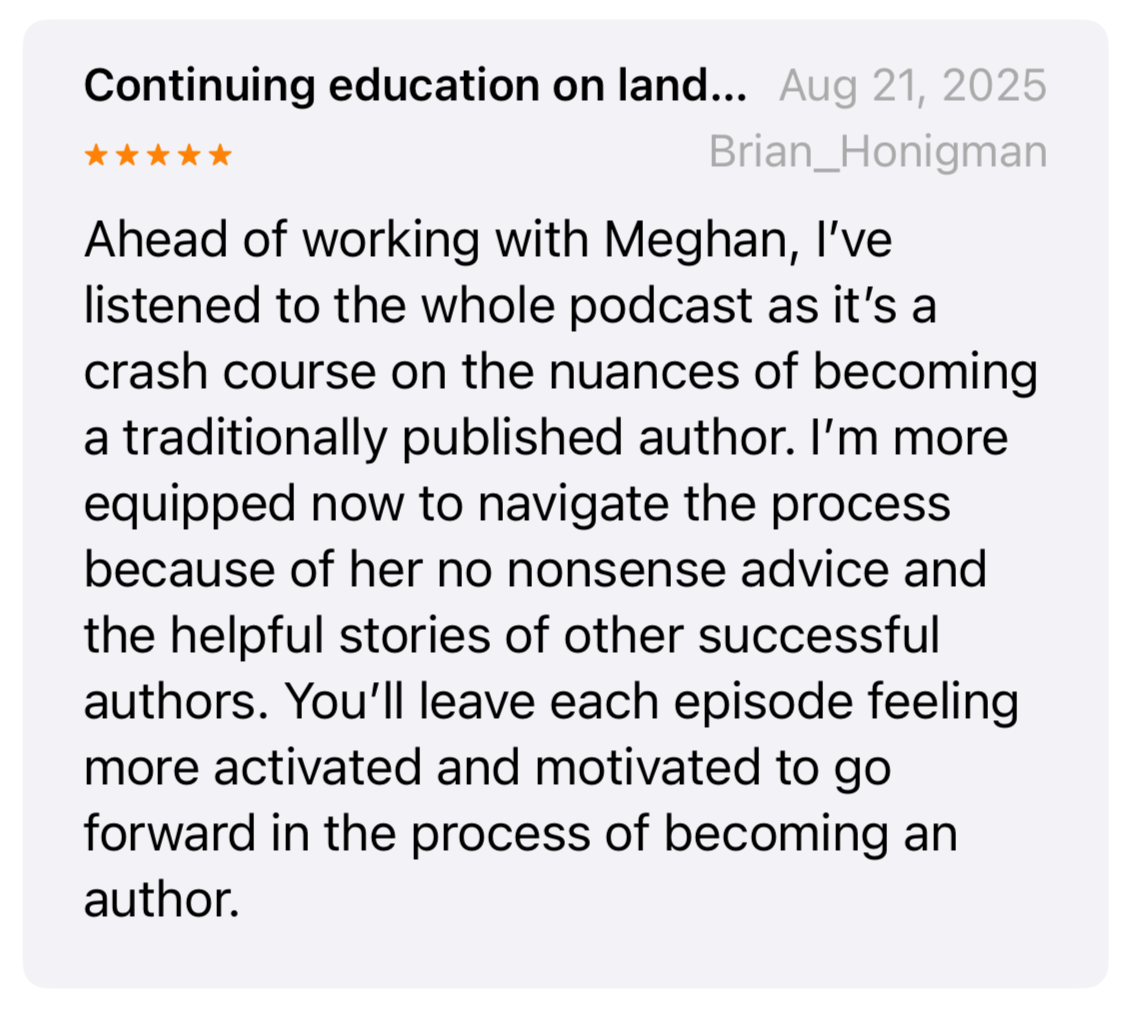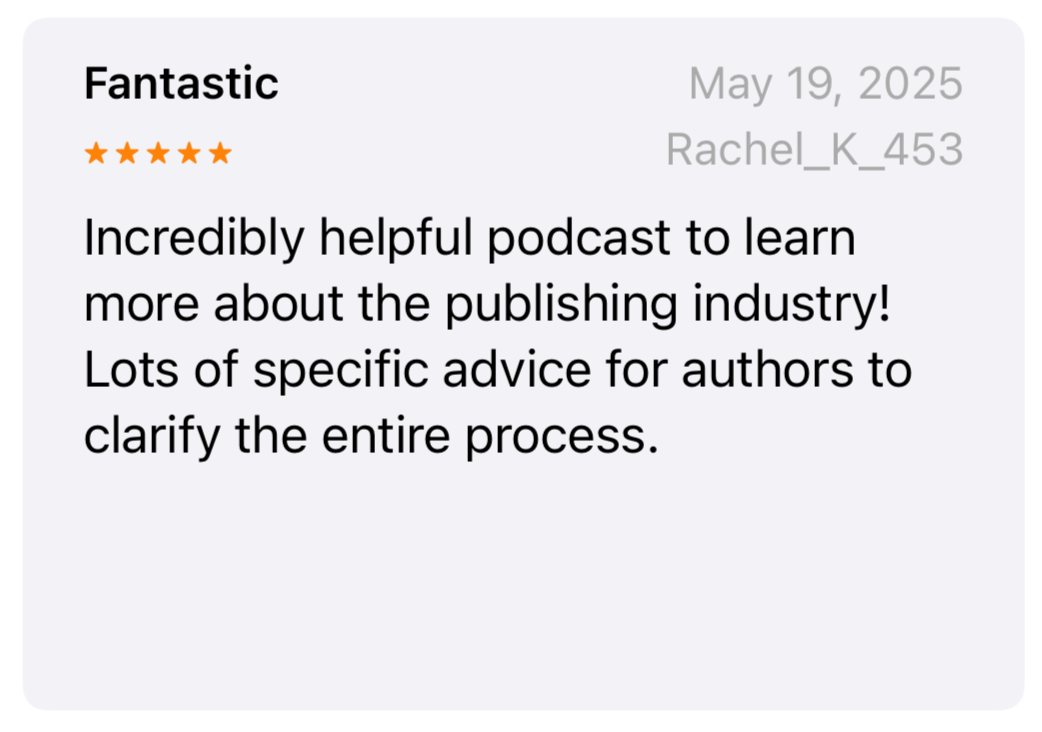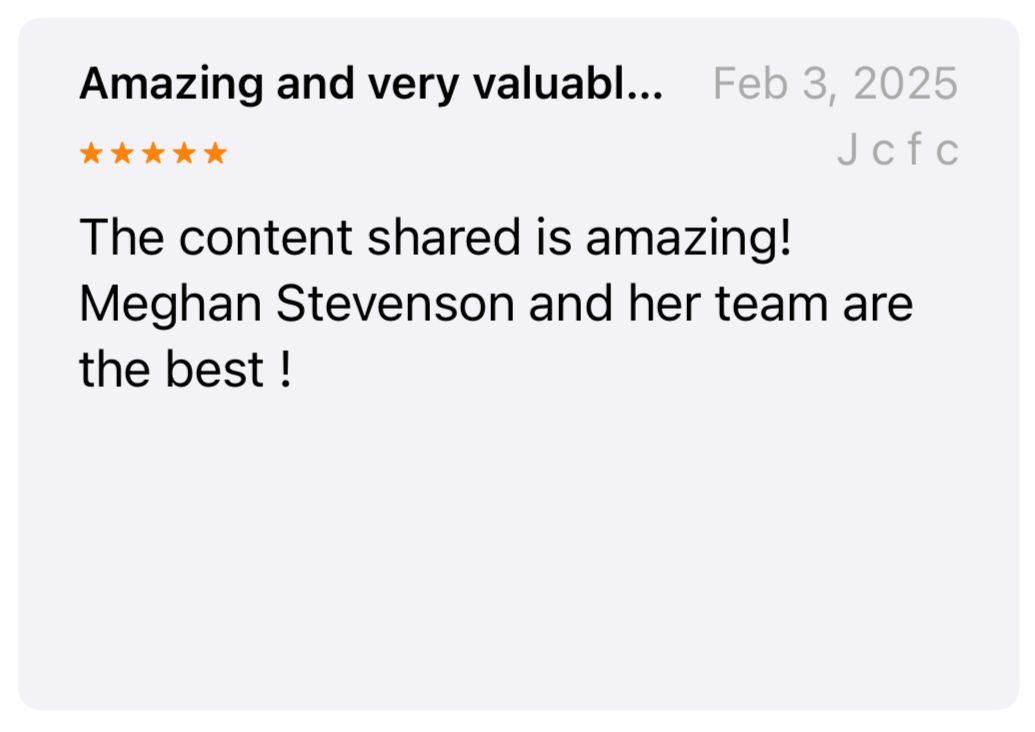Kind of a Big Book Deal
The podcast for every entrepreneur who wants to land a book deal—without losing your mind.
Traditional publishing expert Meghan Stevenson blasts open the gates of the “Big 5” — Penguin Random House, Simon & Schuster, HarperCollins, Hachette, and Macmillan — to share what every entrepreneur and expert needs to know about landing a book deal.
In episodes released every Monday, Meghan shares wisdom and stories from 20+ years in publishing as well as interviews with authors, literary agents, and editors. She also answers questions from listeners like you.
Whether you are an experienced entrepreneur with an empire or are just starting out — this podcast will help you understand what you need to do in order to turn your dream of being a bestselling author into real life.
Episode 36 - The One Question Every Author Must Answer to Land a Book Deal
In this episode, Meghan Stevenson explains the real question publishers care about: how many copies you can sell and exactly how you’ll do it. She walks listeners through the core elements of her book deal readiness assessment, revealing why having a strong idea alone isn’t enough. Your business, audience, intellectual property, and proven sales systems all work together to determine whether publishers see you as a smart investment.
Episode 35 - Seven Things Nobody is Telling You About Writing a Book People Buy
In this episode, Meghan Stevenson delivers a bold, honest breakdown of what it really takes to write and publish a nonfiction book that sells. She challenges the idea that passion and personal stories are enough, reminding listeners that readers care most about solving their own problems—your job as an author is to serve them.
Episode 34 - An Inside Look at Traditional Publishing From Authors and Book Coaches Lauren Marie Fleming and Richelle Fredson
In this episode of Kind of a Big Book Deal, Meghan Stevenson sits down with publishing experts Lauren Marie Fleming and Richelle Fredson for an honest, no-fluff conversation about what it really takes to write a meaningful book and navigate traditional publishing without losing yourself along the way.
Episode 33 - The Biggest Mistake Entrepreneurs Make When Trying To Get a Book Deal
In this episode, Meghan Stevenson pulls back the curtain on what really matters in traditional publishing for entrepreneurs and experts. She explains why great ideas alone are not enough, and why proof of concept, a strong audience, and a clear strategy are essential for success. Meghan introduces her “Three P’s” framework: Potential, Platform, and Proposal, and shows how each one plays a critical role in getting publishers to say yes.
Episode 32 - How I Would Get a Book Deal in 2026 If I Had to Start Over
In this episode, publishing expert and host Meghan Stevenson breaks down exactly how she would land a traditional book deal in 2026 if she had no followers, no connections, and only an idea she believed in. Instead of chasing shortcuts or hype, Meghan lays out a clear, grounded path built on business growth, real audience demand, and patience.
Episode 31 - Skills and Secrets for Your Book Journey with Sexpert and Author Caitlin V
In this episode of Kind of a Big Book Deal, host Meghan Stevenson sits down with sex and relationship coach Caitlin V to explore what it really takes to turn years of lived experience, research, and repetition into a powerful book. Caitlin shares her journey from academia to coaching to YouTube fame, and why writing a book was never about money, influence, or status.
Episode 30 — Why Traditional Books Sell More (Than Self-Published or Hybrid)
Most books never break 300 copies. That single fact alone stops a lot of aspiring authors in their tracks. In this episode of the Kind of a Big Book Deal Podcast, Meghan Stevenson breaks down why traditionally published books consistently sell more copies and what that means if you are thinking about writing a book.
Episode 29 - Learn (Nearly) Everything You Need to Know About Traditional Publishing with Author Jamie Sears
What if landing a book deal wasn’t about luck at all, but about learning how the publishing world really works? In this episode of Kind of a Big Book Deal, Meghan sits down with bestselling author and former teacher–turned–entrepreneur Jamie Sears to break open the truth behind traditional publishing, platform building, and writing a book that actually gets picked up.
Episode 28 - Get a Book Deal This Year
What if the book deal you dream about isn’t actually far away, it just needs the right plan, the right timing, and the right support? In this episode, Meghan Stevenson opens the doors to traditional publishing even wider by sharing the exact framework she uses to help experts and entrepreneurs land major book deals. She breaks down her trusted Three P Framework and explains why each step matters more than most aspiring authors realize. From understanding whether your idea can sell, to proving you have a real, working audience, to crafting a compelling proposal, Meghan shows you the path publishers actually want to see.
Episode 27 - How to Hire a Book Coach
What if the guidance you’re trusting for your book dream is actually slowing you down? In this episode, Meghan pulls back the curtain on the publishing world, and the people profiting from it, to help you avoid the traps so many first-time authors fall into. After 20+ years in traditional publishing, she’s seen how crowded the “get published” space has become, and how much of it is built on shaky advice, recycled teachings, and experts with no real experience.
Episode 26 - Leverage PR to Build Platform with Caitlin Copple and Full Swing PR
What if your story could open doors and reshape who gets to be seen? In this episode, Meghan talks with PR expert Caitlin Copple, co-founder of Full Swing PR, about the kind of visibility that actually drives results for entrepreneurs who want book deals and real impact.
Episode 25 - How and When To Choose Your Book's Categories and Comps
What if your book idea isn’t the problem, it’s your platform? In this episode of Kind of a Big Book Deal, publishing expert Meghan Stevenson breaks down why building your author platform matters more than obsessing over comps, subcategories, or bookstore placement.
Episode 24 - Why Authors Can Stop Competing with Ruchika Malhotra
What if success wasn’t about competition but collaboration? In this episode of Kind of a Big Book Deal, host Meghan Stevenson sits down with bestselling author Ruchika Tulshyan, whose new book Uncompete flips the script on what it means to win. Ruchika shares how the myth of “doing it all yourself” keeps entrepreneurs and authors burnt out and isolated and how equity, generosity, and radical collaboration can build true, sustainable success.
Episode 23 - How to Build an Author Platform With—or Without—Social Media Followers
In this episode of Kind of a Big Book Deal, host Meghan Stevenson reveals the missing piece behind most failed book pitches: intellectual property that’s uniquely yours. She explains why having your own framework, language, and approach isn’t just nice, it’s non-negotiable if you want to stand out to agents and publishers.
Episode 22 - From Corporate Darling to Entrepreneurial Author with Jamie Trull
In this episode, host Meghan Stevenson sits down with CPA and profit strategist Jamie Trull to talk about building businesses that thrive, not just survive. Jamie shares her journey from corporate life at Coca-Cola to creating a booming financial education platform. Jamie’s new book Hidden Profit offers a smarter, more adaptable approach to managing money. She also reveals the power of building genuine community and how showing up with service first leads to long-term loyalty and growth.
Episode 21 - When Rejections Matter—and When They Don't
In this episode of Kind of a Big Book Deal, host Meghan Stevenson pulls back the curtain on the truth behind publishing rejections and what they actually mean for your book journey. It offers clarity and encouragement for aspiring nonfiction authors who feel defeated by “no.” By breaking down real industry language, Megan equips entrepreneurs to know when to adapt, when to pivot, and when to move forward with confidence.
Episode 20 - How Self-Published Authors Get a Traditional Publisher
What does it really take to land a traditional book deal and is it even worth the leap from self-publishing? In this episode of Kind of a Big Book Deal, host Meghan Stevenson answers a common question from listener DeShanna, an educator with three self-published books who’s eager to break into traditional publishing.
Episode 19 - How 18 Months of Rejection Turned Into a Six-Figure Book Deal with Dr. Natalie Nixon
What if the very thing holding you back from a traditional book deal isn’t your writing, but your platform? In this episode, Meghan sits down with Dr. Natalie Nixon to unpack the highs and lows of her author journey. From countless rejections to finally landing a deal for The Creativity Leap, Natalie reveals the grit, courage, and community support it took to get there.
Episode 18 - Is Traditional Publishing Right For You?
What separates the dreamers from the authors with a big book deal? In this real talk episode, Meghan Stevenson pulls no punches. She shares the uncomfortable truth behind traditional publishing success rates and the one thing that determines who makes it and who doesn’t: alignment. If you’re an entrepreneur hoping to land a publishing contract, this episode will challenge your assumptions and help you decide if the traditional path is really right for you.
Episode 17 - How Many Followers You Need to Get a Book Deal
In this episode of the Kind of a Big Book Deal podcast, Meghan tackles the question: Is there a magic number for your author platform? Discover what a modern, successful author platform really looks like today, why it’s deeply personal to each nonfiction author, and how to tailor yours for maximum impact.







